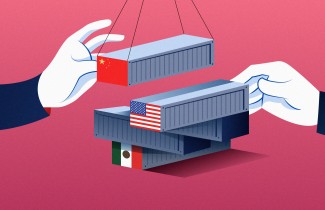Inflationary Pressures in Sight
Annual inflation began to accelerate at the beginning of the year and could limit the Mexico's monetary policy tools
This week the National Institute of Statistics and Geography (INEGI) published the general inflation which stood at 3.84 percent annually in the first half of February. Inside, the consumer prices The core component also grew 3.84 percent while inflation in the most volatile sectors (non-core) stood at 3.85 percent annually. The high prices of merchandise inflation (5.5 percent) stand out, which contrasts with the moderation of services inflation (2.1 percent). The annual inflation it begins to accelerate at the beginning of the year and could limit the country’s monetary policy tools.
Although headline inflation continues within the variability margin of Banco de México, there are factors that may push inflation upward in the future. First, by the shocks of supply of agricultural products in the world coupled with an increase in its demand for global economic recovery. In fact, international prices of the wheat, corn, soy, and sugar, among others, have shown an increase in their prices that could have indirect effects on the economy.
Second, due to the upward trend in energy prices, above all, oil. The extreme weather caused a significant rise in the prices of crude oil and natural gas, and OPEC’s stance to continue with production cuts will push prices even higher. Without additional government subsidies, the energy increases will be transferred to final consumers through higher costs in electricity and gasoline. Passage of the recent energy reform will only push electricity prices up even further.
Third, for the recent depreciation of the peso and an expectation of further deterioration in the future. The dollar has recently been strengthened by the rise in bond rates in the secondary markets of that country (due to forecasts of higher inflation) and is appreciating the dollar. Added to that, the energy reform, which inhibits private and foreign investment, and future anti-market laws, will pressure the peso towards depreciation. The persistent devaluation of the peso will be reflected in higher costs of goods imports, which will raise underlying inflation, especially in the merchandise category.
Thus, inflation could enter an episode of deterioration that could mitigate the country’s monetary policy tools. It will be interesting to observe the position of the members of the governing board in this new scenario, considering that now three of the five members have a more dovish tendency.
The author is CEO of GAMMA Financial Solutions and professor of Economics and Finance at EGADE Business School. He has a PhD in Finance and a Masters in Financial Economics, both from the University of Essex in the UK. He was the chief economist for Mexico at Itau BBA, deputy general director of International Financial Organizations at SHCP and researcher at Banco de México.
Article originally published in El Financiero.



